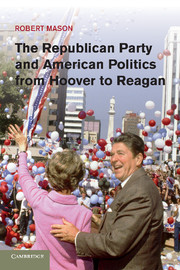Book contents
- Frontmatter
- Contents
- Acknowledgments
- Introduction
- 1 “From Old Home Melodies to Jazz Music”: 1928–1933
- 2 “As Maine Goes, So Goes Vermont”: 1933–1939
- 3 “The Simple Barefoot Wall Street Lawyer”: 1939–1945
- 4 “Liberty versus Socialism”: 1945–1953
- 5 “Modern Republicanism”: 1953–1961
- 6 “A Choice, Not an Echo”: 1960–1968
- 7 “There’s a Realignment Going On”: 1968–1976
- 8 “You Are Witnessing the Great Realignment”: 1977–1989
- Conclusion
- Archival Sources
- Index
- References
3 - “The Simple Barefoot Wall Street Lawyer”: 1939–1945
Published online by Cambridge University Press: 05 December 2011
- Frontmatter
- Contents
- Acknowledgments
- Introduction
- 1 “From Old Home Melodies to Jazz Music”: 1928–1933
- 2 “As Maine Goes, So Goes Vermont”: 1933–1939
- 3 “The Simple Barefoot Wall Street Lawyer”: 1939–1945
- 4 “Liberty versus Socialism”: 1945–1953
- 5 “Modern Republicanism”: 1953–1961
- 6 “A Choice, Not an Echo”: 1960–1968
- 7 “There’s a Realignment Going On”: 1968–1976
- 8 “You Are Witnessing the Great Realignment”: 1977–1989
- Conclusion
- Archival Sources
- Index
- References
Summary
In the early fall of 1939, not long after the outbreak of World War II in Europe, Herbert Hoover gave Thomas E. Dewey some advice about how to pursue his 1940 presidential ambition. The advice addressed the difficulty of establishing a position on foreign policy, as war erupted in Europe, at a time when there was much division within the party – and among the electorate – about how to respond, and when the geopolitical future held so much uncertainty. Hoover told Dewey to avoid discussion of national issues as much as possible, to concentrate instead on state and city matters. This was because events in foreign policy were moving so rapidly that any statements at that point potentially endangered his intended quest for the nomination and then, if successful, for the presidency. Such statements might create policy commitments that later became unwise or unpopular in light of subsequent developments, Hoover explained. Conveniently for Dewey, his position as New York County district attorney provided him with an excuse to evade questions of foreign policy and stress another issue instead, connected with his current duties, one of broad appeal. “Everybody’s against crime and all applaud the man who is doing such a great job as [Dewey] is in catching up with evildoers,” according to Hoover. The strategic advice was good. Foreign policy was a difficult subject and a dangerous issue, especially for Republicans when anti-interventionism remained widespread within the party yet the tide of neutrality, strong during the 1930s, was starting to retreat.
Hoover’s advice was not good enough, however, to save Dewey. Unable to escape entirely the discussion of foreign policy with the world at war, Dewey revealed his inexperience. Moreover, he voiced both internationalist and anti-interventionist sympathies. After France’s fall to Nazi Germany in May 1940 – a development that confronted the United States with the prospect of an entirely hostile, totalitarian Europe, in addition to similarly threatening Japanese domination of east Asia – Dewey’s candidacy seemed increasingly implausible. The nation did not need a novice in foreign policy as president, and many Americans were concluding that a lack of realism about the totalitarian threat had clouded the anti-interventionist view of global affairs, the perspective identified with the GOP.
- Type
- Chapter
- Information
- Publisher: Cambridge University PressPrint publication year: 2011



